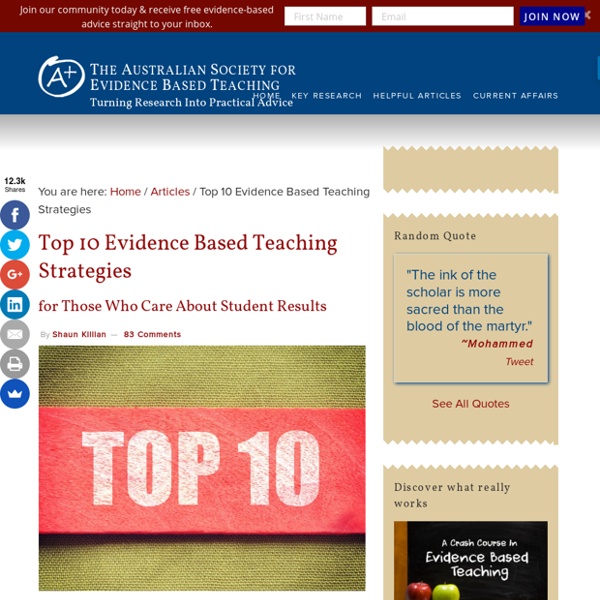motamediv
Mastery Learning: An Effective Teaching Strategy Vahid Motamedi Assistant Professor Department of Educational Technology Faculty of Psychology & Education Tarbiat Moallem University
Center for Teaching & Learning
Active Learning Strategies help to initiate learners and instructors into effective ways to help everyone engage in activities based on ideas about how people learn. Multiple active learning strategies may be used in each of the active learning designs. Review an annotated list of active learning strategies 1. Sit & talk with peers nearby
Five principles of pedagogy
People talk a lot about “pedagogy”—but what do they actually mean? In this post, I suggest five principles that might help clarify matters. I have been meaning to write this post for a while, as a condensed conclusion from my long essays, Education’s coming revolution and In the beginning was the conversation. But the the spark that has persuaded me to get it down on paper was given to me by a Twitter conversation with Pete Bell, an ICT Examiner, who quoted J Bruner saying “Teaching is the canny art of intellectual temptation”.
Implementation of Mastery Learning in Nursing Education
Mastery learning, also known as outcomes-based and competency-based education, has been successfully used in various disciplines to ensure student success. In general, the method promotes student success on the basis of preset criteria. These criteria are not based solely on students’ academic ability but allow for flexibility in instruction and content. Mastery learning can thus be an integral component of a nursing program that admits diverse students. Mastery learning can enhance the academic performance of diverse students despite differences such as geographic location or ethnic and racial group. Because of its various components, mastery learning can be adapted for use in many disciplines.
Teacher Student Relationships Crucial to Results
Strong teacher student relationships are crucial. To a large extent, the nature of your relationship with your students dictates the impact that you have on them. If you want to have a positive and lasting difference on your kids, you need to forge productive teacher student relationships.
edutopia
Patricia Chen, a postdoctoral researcher at Stanford and the lead author of the study, says she often had students coming to her lamenting their poor test scores. "Many students have come to me after their exams trying to understand why they did not do as well as they had expected, despite their hard work,” she recalls. She suspected that the issue was that they lacked awareness of how ill-prepared they were—metacognitive awareness—and that led to the unexpectedly low scores.
5 New Approaches to Teaching and Learning: The Next Frontier
In my first year of teaching about a decade ago, I was given very straightforward instructions for what I was charged to do. I was told to follow the curriculum, ensure that my students didn’t disrupt the classroom, meet the state standards for my subject, and make sure that my students passed the standardized exams at the end of the year. To meet these goals, I was provided with a curriculum, a school rulebook, test prep materials, and was wished good luck. The curriculum I was given consisted of a set of lessons that were organized like a script. The formula was simple: wash, rinse and repeat.
ON LIBRARIES: Why Librarians – Hilda K. Weisburg
Tight budgets have given rise to administrators wondering why they need librarians. Too often they decide librarians aren’t really necessary. We know otherwise, and if we want to change that mindset we need to speak out where the power stakeholders can hear us. A few days ago I was contacted by a librarian who was going to be speaking to a county superintendents’ meeting. She had fifteen minutes to answer that question. It was a wonderful opportunity and somewhat intimidating at the same time.



